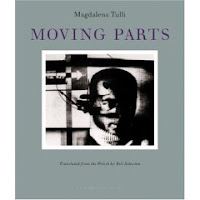| Reply to Thread New Thread |
|
|
#1 |
|
|
 Title: Moving Parts Author: Magdalena Tulli Pages: 133 Moving Parts is an incredible, truly insightful novel in which the narrator looses control of his story. What? Yes! He becomes a character and cannot get out of the view of the reader. This is not a book to breeze though, it is jam packed full of brilliant quotes and stunning writing. The concept of this novel, and the storyline are completely unlike anything that I have read before. The depth in language use and parts of speech was over my head many times, but a lover of grammar would fall in love with the way words such as "predicate" and "parts of speech" are woven into regular everyday language, which the author does with ease. While reading the word choice and use of certain phrases I could not help but to feel that I was missing out, that it was incredibly vast and I was only drinking from the surface. If you are a person who loves to think, who loves incredible well-thought deep quotes and an intense knowledge of language captivates you, this is your book. Read it and you will love it. It will speak to you and drive you to a deeper understanding about the other books that you love to read. It will guide you through the feelings characters suffer in being written about, and those that narrators must endure in order to tell their story (even if they don't want to), it will help you know more about the concept of a novel, in which all is created...but by whom? Who is in charge of these books that we read, who leads the reader? How would it be if things were not the way they should be in a novel, if the characters did not follow what the narrator asked of them, if past and future were slowly blurred and confusion was the key theme of the story? Read Moving Parts by Magdalena Tulli and you will surely be submersed in this fictional chaos of writing and will be taken to a deeper understanding of our current idea: a fictional novel, in which nothing really exists, except in our minds, our desires and on the paper. Quotes from Moving Parts: "All he can do, and that only to a certain degree, is to govern grammatical forms, an essential element, especially as open space, of their own accord taking on the forms of the future tense, without any obligations" (p.26). "The parts, always the same ones, wait like traps into which new characters will continue to fall, irrespective of their own wishes, promises, and misgivings" (p. 62). "They even tried to joke about this process, but their jokes were not entirely successful; they were not funny enough for them to convince themselves that they were sagely beyond the reach of grammar. And so in the end, exhausted by the anticipation of leaving and by visions of an uncertain future, they changed the subject, returning to a certain betrayal, because betrayal was at least something they were capable of understanding" (p. 95). " Hardly anything is possible any longer. And no truth will appear until the secure forms of the past tense impose order" (p. 132). |
|
|
|
|
#2 |
|
|
Nice to read this second review by B&b ex libris of a Magdalena Tulli book (I've just read her comments on "Dreams and Stones"). Tulli sounds to be a genuine talent. This is what I found about her on the internet:
Magdalena Tulli was born in 1955. She studied psychology and spent 6 months working in the Antarctic at a polar institute. She completed her studies by getting a degree in Biology and Zoology in Krak?w. She also worked as a nurse in that city until 1986. She published her first book "Dreams and Stones" at the age of 40, for which she received the Nagroda Fundacji im. Kościelskich (Kościelski Prize, I imagine). Her next novel "In Red" was nominated for the Nike Prize in 1999. (The Nike is Poland's most prestigious literary prize.) In 2003 the author published "Moving Parts" (also nominated for the Nike) and "Instead of Going to Court - A Report on the Language of Hatred" written together with Sergiusz Kowalski. She was also nominated for the Impac Dublin literary award in 2007. Magdalena Tulli translates Italian and French literature (e.g. Italo Calvino, and Marcel Proust). She received the World Literature Prize for her translation of Fleur Jaeggy's "The Anger of Heaven". Her own works have been translated into English, German, Czech, Swedish, Hungarian, Latvian and Russian. So she will be well-known all over Europe. One Polish critic suggested she was the new Bruno Schulz. If she was born in 1955, she will have spent the first 35 years of her life under the Communist r?gime in Poland. That, coupled with Poland's traumatic WWII past must surely have affected and influenced her writings. We have to thank the translator Bill Johnston that her books are indeed available in the English language. He is a British-born translator, and has directed Polish Studies Center at Indiana University in the USA. |
|
|
| Reply to Thread New Thread |
«
Previous Thread
|
Next Thread
»
| Currently Active Users Viewing This Thread: 1 (0 members and 1 guests) | |
|
|





 Linear Mode
Linear Mode


